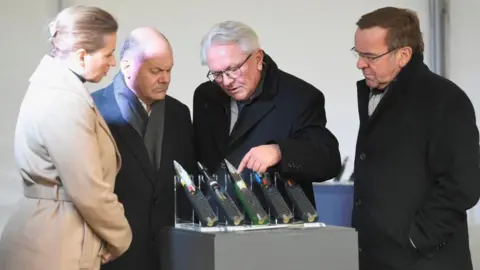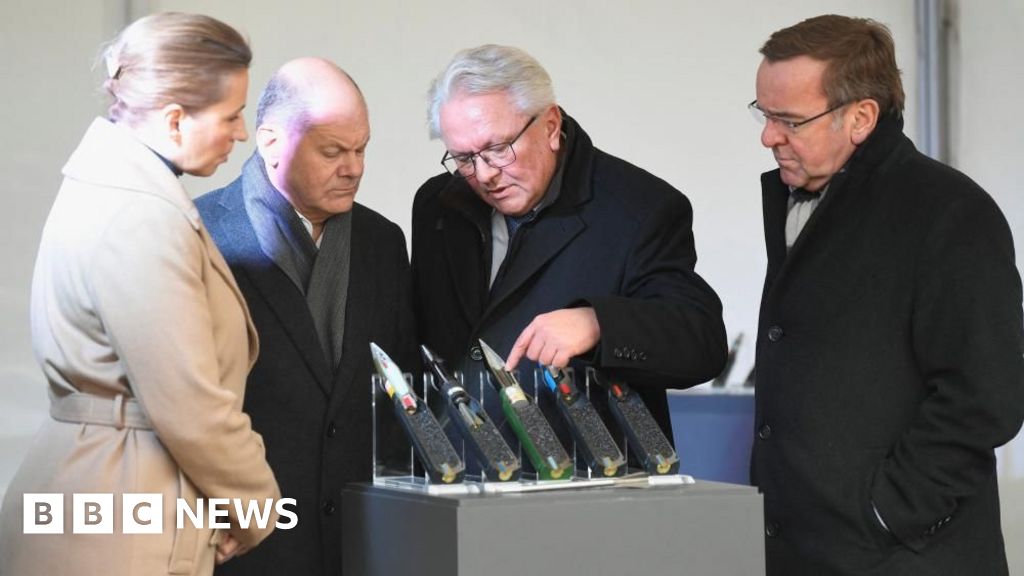By Paul Kirby, BBC News
 REUTERS/Fabian Bimmer
REUTERS/Fabian BimmerGerman political figures have reacted angrily to a report that Russia had plotted to kill the head of Germany’s biggest arms company Rheinmetall, Armin Papperger.
The CNN report said US officials had told their counterparts in Berlin earlier this year and security around him was stepped up.
Germany’s interior ministry refused to comment but Foreign Minister Annalena Baerbock appeared to confirm the details.
“In view of latest reports on Rheinmetall, this is what we have actually been communicating more and more clearly in recent months,” she told reporters at the Nato summit in Washington. “Russia is waging a hybrid war of aggression.”
In Moscow, Kremlin spokesman Dmitry Peskov rejected the allegations. “It’s all presented in the style of another fake story, so such reports cannot be taken seriously.”
Rheinmetall avoided commenting on issues of “corporate security”, but Mr Papperger is now being described as the most highly protected figure in Germany’s economy. He told the Financial Times that German authorities had imposed a “great deal of security around my person”.
The company is one of the world’s biggest producers of ammunition and has become key to supplying Ukraine with arms, armoured vehicles and other military equipment.
Rheinmetall recently opened a tank repair plant in western Ukraine. Last month, it signed an agreement with Ukraine to expand co-operation in the coming years, including a joint venture to produce artillery shells.
Mr Papperger said at the time his company wanted to hand over the first Lynx infantry fighting vehicles later this year and to start producing them in Ukraine soon.
Although Chancellor Olaf Scholz avoided commenting on the reported assassination plot directly, he said it was well known that Germany was exposed to a variety of Russian threats and was paying close attention to them.
 Thomas Trutschel/Photothek via Getty Images
Thomas Trutschel/Photothek via Getty ImagesInterior Minister Nancy Faeser said “we are taking very seriously the significantly heightened threat of Russian aggression”.
Earlier this week, a senior Nato official told the BBC that Russia was “engaging in aggressive covert operations across Europe – involving sabotage, arson and assassination plots – aimed at weakening public support for Ukraine”.
The German foreign minister said the Baltic states had already highlighted the various methods deployed by Russia’s Vladimir Putin in his war on Ukraine. As well as sabotage, she spoke of cyberattacks and disrupting GPS signals so that Baltic flights could no longer land in neighbouring countries.
“We have seen that there have been attacks on factories, and that again underlines that, together, we as Europeans must protect ourselves as best we can and not be naive,” Ms Baerbock told reporters.
In early May, a building complex owned by the Diehl Metall firm went up in flames in south-west Berlin. Although a technical fault was blamed for the fire, sabotage has not been ruled out. Suspicious fires have also been reported in Poland and Lithuania.
Last April, Mr Papperger’s garden house was set alight at Hermannsburg in northern Germany, although there has been no evidence of a Russian link.
The fire was quickly brought under control and a rambling, anonymous confession purportedly from leftist militants appeared on activist network Indymedia.
The reported plot against such a high-profile German CEO has prompted widespread alarm.
Leading conservative figure Roderich Kiesewetter said the chancellor should come clean with the German population about how great the threat from Russia really was. German intelligence needed to be boosted to the level of neighbouring countries, he said.
“We must take it very seriously and also prepare ourselves accordingly,” he told public broadcaster ZDF.
Michael Roth, who chairs Germany’s foreign affairs committee told Bild newspaper that Vladimir Putin was waging a “war of extermination not only against Ukraine, but against its supporters and our values”.
The head of the defence committee, Marcus Faber, added his condemnation, saying if information about Russian intelligence involvement came to light, then “the expulsion of diplomats must follow and, if necessary, international arrest warrants must be issued”.


